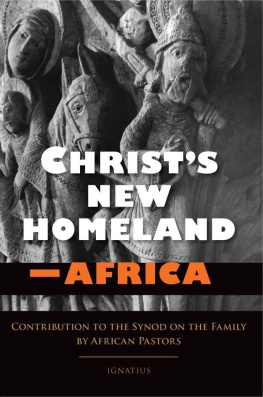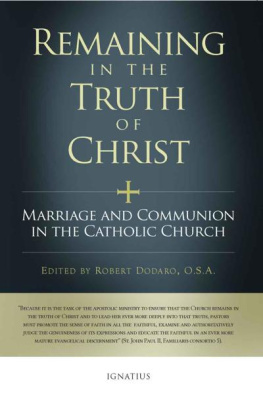FAITH FINDING A VOICE
To my brothers, Peter and John,
who in very different ways lived life to the full with faithfulness and joy

Contents
Theophany is not a word in everyday use. Yet it refers to an experience that is not at all uncommon. Theophany means a manifestation of God. The word is normally used to indicate a direct and awesome manifestation of the divine, but it can also refer to those many different ways in which our attention is drawn, often compellingly, to the horizon beyond our normal attention, to the horizon of the infinite: the horizon that opens on to Gods presence in our lives.
This book is an exploration of that dimension of our lives: our openness to the presence of God. It is also an exploration of how that sense of Gods presence finds a voice both in our history and in our lives. It is, not surprisingly, an exploration arising from and shaped by my Christian faith and the definitive theophany given to us in the person of Jesus Christ. I hope it also carries clear signs of much friendship and dialogue with members of the other great world faiths, for that too is very much part of my journey.
At the heart of the Christian faith is the relationship that a person has with Jesus Christ. In many ways, that relationship is summed up in a single phrase: missionary disciple. This is what we seek to be: disciples, or companions of Jesus, treasuring the joy that he brings into our lives; and missionary, sharing in the task he receives from his heavenly Father, the reason for his coming into our history in the incarnation.
This faith entails believing that Jesus Christ offers salvation for humanity through his incarnation, ministry, suffering, resurrection and glorification. St Paul understood the totality of Christs mission in terms of the first fruits (1 Cor 15.23). By this proclamation he means the offering to all people of the divine harvest of love, a harvest gained by Christs offering of himself, which every person is able to enjoy. Pope Francis speaks of this harvest at the beginning of his Apostolic Exhortation Evangelii Gaudium: The Joy of the Gospel, when he writes of our being liberated from sin, sorrow, inner emptiness and loneliness (EG, 1). I should like to think that Faith Finding a Voice is a way of understanding and reflecting upon this document.
There is much within the contemporary world which is preventing us from receiving the fullness of this divine harvest. We can so easily be preoccupied with excessive self-interest, needless gratification and pleasure. This attitude is a type of consumerism which ensures that there is no longer room for others, no place for the poor (EG, 2). Not only may our personal lives be marked in this way, but so too may our community and civic lives, leaving many people with a strong sense that they are outside the circle of benefit and security, and unable to find a point of entry. The challenge facing the Christian is that of bringing the light of Christ: a light throws into sharp relief the truths of our human nature, to bear on the darkest places in our hearts and in our world. This light, and the joys it brings, are found in the Gospel of Jesus Christ, in whom all darkness is destroyed (Col 1.1114).
Fundamental to this task is our discipleship. By our attentive dedication to the teaching and activity of Jesus as the bringer of Gods reign (Mk 1.1415), we grow to understand the positive response required from us in terms of metanoia, radical change and renewed belief in the saving power of the Gospel (Mk 1.15). In return we are able to receive from God the challenges, gifts and blessings which the dawning of his reign offers (e.g., Mt 5.3). The Gospel is concerned both now and in the future with the effects of Gods kingdom, which is about loving God who reigns in our world (EG, 180). As his disciples we seek his reign above all else (Mt 6.33). The extent to which we do so will be the extent to which society will be able to provide a suitable environment where universal fraternity, justice, peace and dignity (EG, 180) will flourish.
As missionary disciples we also have the task of finding the voice that will communicate this faith. In one sense, this is the voice of direct proclamation (Rom 10.1718), the preaching of the message of the Gospel as found in the homily, lecture, address or catechetical instruction. Such means of presenting Catholic life and teaching always seek to share and deepen our understanding of the message and truth of our faith. They are also given in order that we might create dialogue and partnership with those around us, so that the common good of society might be enhanced and renewed. The contemporary world, of course, is full of diverse voices. There are voices which offer immediate satisfaction of needs and desires; those which promote a vision of the person as a self-sufficient individual, striving always for autonomy and freedom; those caring for the distant consequences of a course of action and offering no substantial moral framework; those extolling violence as a virtue; those extolling apathy as the solution for human fulfilment. The task of the missionary disciple is to understand how to enable the voice of Christ to be heard in this context by surfacing the deeper and lasting questions which echo in our hearts. Through our ministry we must always proclaim the voice of God and his saving power, which is given to humanity through the redeeming work of Christ.
We might ask, however, how this authentic voice is to be acquired. Here, I suggest that we return to the voice of the Father spoken to the Son, Jesus, at his Baptism (Mk 1.11; Mt 3.17; Lk 3.22; see also Jn 12.28) and Transfiguration (Mk 9.7; Mt 17.5; Lk 9.35): You are my Son, the Beloved; with you I am well pleased (Mk 1.11 [NRSV]). The voice of the Father at the Baptism of Jesus is the voice of affirmation. It declares the unique royal (Ps 2.7) and prophetic role (Is 42.1) of the Son, who identifies wholly with humanity and, as a result of his absolute fidelity to his vocation, also offers salvation to the world, exchanging sin and darkness for grace and light. The voice of Jesus the Good Shepherd is all-embracing. It is addressed to the believing community (Jn 10.4); at the same time he is calling individuals by name (Jn 10.3), given our status as unique and precious sons and daughters of God; even the dead hear the voice of the Son in order that they may be granted eternal life by the Father (Jn 5.256). At every celebration of Baptism this divine voice is repeated, bringing sinful humanity into the divine life of God, through which we are affirmed and renewed by the power of the Holy Spirit. For us, then, to respond positively to the voice of God in the ways I suggest is to reaffirm our Baptismal calling through Jesus as his royal, prophetic and priestly sons and daughters.
The divine voice at the Transfiguration is also important because it points to the future, to the hope of heavenly glory offered by Jesus at his resurrection (e.g., Lk 24.256) and ascension (Acts 1.8). Here, the Risen Lord commands his disciples to witness to his glory in the power of the Holy Spirit to the ends of the earth (Acts 1.8); in this context we shall be asking about the purpose of mission and how this purpose is advanced in relation to the suggestions contained in this book. Despite the evil and suffering in the world, we are offering here the divine voice of hope, the opportunity to follow the way of God in order that humanity might return to the things of God. At the same time we must also be aware that the voice of God is liable to be drowned by the use of too many words spoken too loudly. The voice of God came to Elijah, for example, not in wind, earthquake or fire but in a still small voice (1 Kings 19.12). It is often in silent prayer, through meditation, that we hear Gods voice, showing how, through the Holy Spirit, we are able to exercise the prophetic ministry in our age, which we know is needed in order that the world might radiate justice, peace, compassion and kindness.













